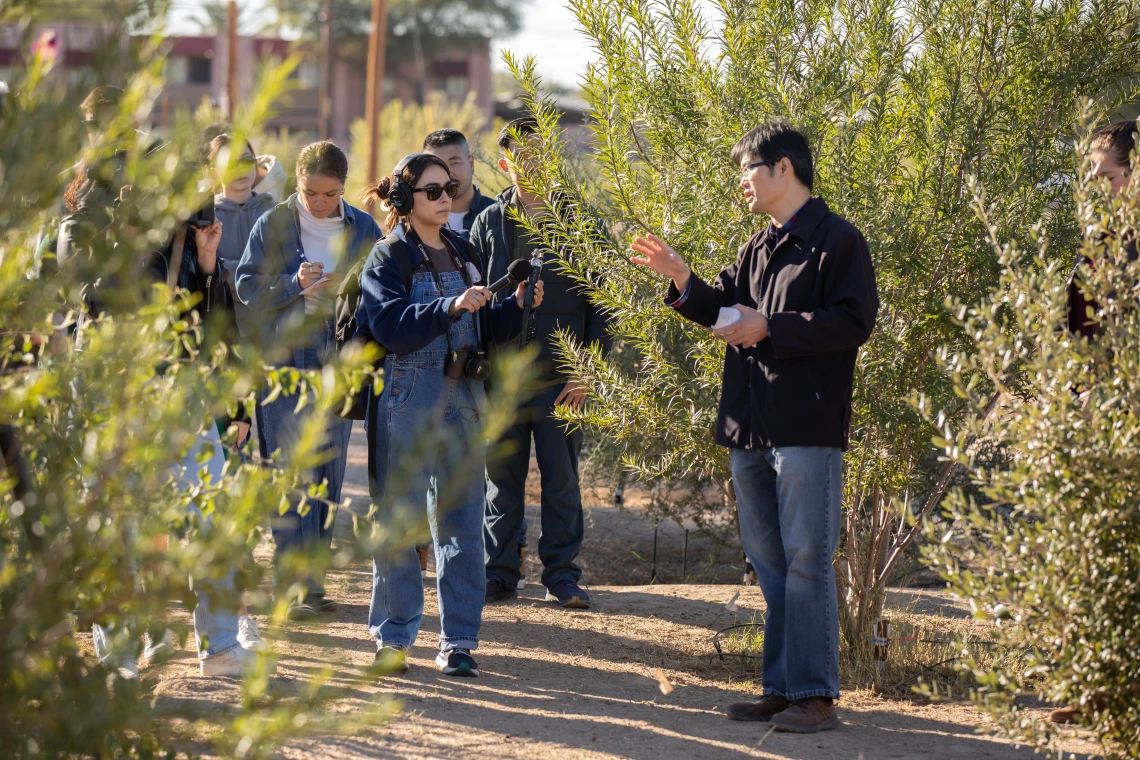Improving water conservation and mitigating Arizona's heat island effect
Research showcase highlights results of Smart Tree Watering Regents' Grant

Bo Yang, associate dean for research and professor of landscape architecture and urban planning in the College of Architecture, Planning and Landscape Architecture, describes smart tree watering processes for Arizona's urban environment.
Chris Richards/University of Arizona
The Arizona Board of Regents held a November showcase at the Arizona Experiment Station's Campus Agricultural Center in Tucson, featuring award-winning research from the University of Arizona and Arizona State University around new smart tree watering techniques. Hosting members of the local media, members of the U of A and ASU research team highlighted the results of the Smart Tree Watering Regents' Research Grant.
Media members were invited to observe more than 80 tree saplings and learn more about the findings from the Regents' Grant research project. The showcase particularly highlighted this research's potential to deliver economic benefits, improve water conservation efforts and provide more cooling shade for Arizona residents.
Master of Landscape Architecture students Annalise Hummel, Christian Aguilar Murrieta and Cordell Lee were honored by the American Society of Landscape Architects (ASLA) with an award in the Research Category for their work on this project.
Walking through multiple land plots at the U of A Campus Agricultural Center, the student and faculty research team led discussions around the urgent need to explore new watering strategies that will allow desert plants to adapt and thrive despite the increasingly hot conditions the urban desert ecosystem now faces year-round.
As it looks to implement these techniques across the state, the research team at ASU is developing new machine learning models to show how these smart irrigation techniques can be scaled to fit the needs of municipalities, counties and local communities. Over the following months, the research team will be hosting state agencies, legislators, community organizations, housing developers and municipal leaders for workshops to demonstrate how these techniques can be applied in their neighborhoods, communities or land developments.
The research team has also been invited to present its findings at the upcoming AGU24 conference in Washington, D.C. The AGU annual meeting is the world's largest annual gathering of scientists, educators, policymakers and media focused on sharing research that can open pathways to discoveries that can address our planet's great challenges. Additionally, using the findings and results of the Smart Tree Watering Regents' Grant, the research team plans to partner with the Nature Conservancy in Arizona in exploring innovative solutions to address challenges related to heat resilience and water security due to rapid urban growth and climate change.
The Smart Tree Watering research was conducted as part of ABOR's Regents' Grants program, which is designed to foster unique collaborations that leverage the resources of Arizona's public universities alongside the practical expertise of state agencies such as the Department of Environmental Quality and the Department of Fire and Forestry Management. Since 2022, the Regents' Grant program has funded 21 projects covering environmental, health, economic, safety and societal issues facing Arizona.



